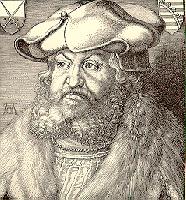Friedrich the Wise
 Friedrich was born in Hartenfels Castle, Torgau (Link to german version) in 1463, the first son of the Elector Ernst of the House of Wettin. In 1486 he succeeded his father, together with his younger brother John, as sovereign of Ernestine Saxony which had been formed after the Leipziger partition of the estate in 1485.
Friedrich was born in Hartenfels Castle, Torgau (Link to german version) in 1463, the first son of the Elector Ernst of the House of Wettin. In 1486 he succeeded his father, together with his younger brother John, as sovereign of Ernestine Saxony which had been formed after the Leipziger partition of the estate in 1485. He was a man of peaceful conciliation and kept his territory out of all warfare during his reign.
Friedrich did attain historical significance primarily as a promoter of knowledge and art. He transformed Wittenberg into his representative residence through the construction of the Castle, Castle Church and university, founded in 1502.
During Luther's lifetime Wittenberg was the home and intellectual center of the reformation movement of which the sovereign was a reliable protector, although only active in the background. Friedrich was nevertheless still deeply imbued with late medieval devoutness, yet had recognized the necessity of a reformation of the erstwhile Papal church.
Friedrich's greatest historical merit was his protection of Martin Luther from the Court of Inquisition. His repertoire of diplomatic stalling tactics stood their test; the opponents never finding a weak point. He saw Luther as unjustly persecuted because Luther could not be found guilty of any real crime.
Friedrich, as was his habit, formed his own opinion after exact consideration of the state of affairs by his advisers and listening to the opinion of a recognized expert, in Luther`s case Erasmus von Rotterdam. Friedrich died at his hunting lodge in Lochau in 1525.